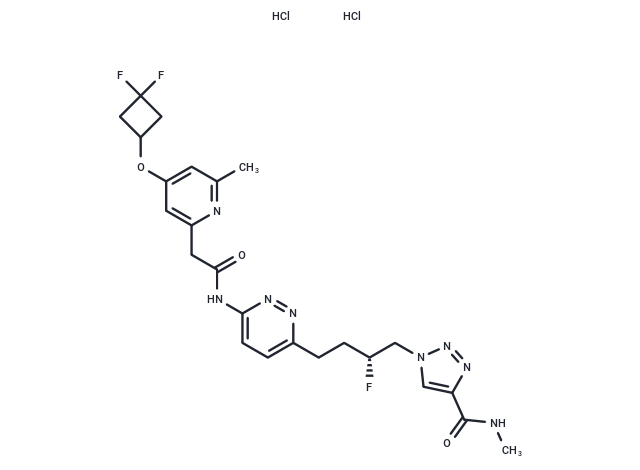Shopping Cart
- Remove All
 Your shopping cart is currently empty
Your shopping cart is currently empty

IPN-60090 dihydrochloride is a potent and specific inhibitor of glutaminase 1 (GLS1) with a remarkable inhibition constant (IC50) of 31 nM. It does not exhibit any inhibitory activity against GLS-2. Furthermore, IPN-60090 dihydrochloride possesses outstanding physicochemical properties and pharmacokinetic characteristics in vivo. Therefore, it is a valuable compound for researching solid tumors, including lung and ovarian cancers.


| Description | IPN-60090 dihydrochloride is a potent and specific inhibitor of glutaminase 1 (GLS1) with a remarkable inhibition constant (IC50) of 31 nM. It does not exhibit any inhibitory activity against GLS-2. Furthermore, IPN-60090 dihydrochloride possesses outstanding physicochemical properties and pharmacokinetic characteristics in vivo. Therefore, it is a valuable compound for researching solid tumors, including lung and ovarian cancers. |
| Targets&IC50 | GLS1:31 nM (IC50) |
| In vitro | Two isoforms of glutaminase exist: GLS-1 (kidney-type or KGA) and GLS-2 (liver-type or LGA), with GLS-1 being widespread and GLS-2 primarily found in the liver. In enzyme assays, IPN60090 dihydrochloride selectively inhibits the GAC isoform of human GLS-1 with an inhibition concentration (IC50) of 31 nM while demonstrating no inhibition of GLS-2, evidenced by an IC50 of >50000 nM. Additionally, this compound effectively inhibits the proliferation of A549 cells, showing an IC50 of 26 nM. |
| In vivo | IPN60090 dihydrochloride exhibits commendable pharmacokinetic properties, characterized by a clearance rate (CL) of 4.1 mL/min/kg, a half-life (t 1/2) of 1 hour, a maximum concentration (C max) of 19 μM, and an oral bioavailability (F%) of 89% when administered intravenously at 3 mg/kg and orally at 10 mg/kg. Furthermore, at a dosage of 100 mg/kg administered orally twice daily for 30 days, IPN60090 dihydrochloride demonstrates efficacy and target engagement comparable to CB-839 at 250 mg/kg, also administered orally twice daily, and this dosage regimen has been tolerated in model studies. Additionally, when given either as monotherapy or in combination with TAK228 , IPN60090 dihydrochloride effectively inhibits tumor growth in a dose-dependent manner. Notably, the combination with TAK228 results in an 85% tumor growth inhibition, significantly outperforming the 28% inhibition observed with IPN60090 dihydrochloride alone. This research utilized female CD-1 mice for pharmacokinetic analysis and a Ru337 non-small cell lung cancer patient-derived xenograft (PDX) subcutaneous mouse model to assess monotherapy and combination therapy outcomes, underscoring the potential of IPN60090 dihydrochloride in cancer treatment regimens. |
| Alias | IPN60090 dihydrochloride |
| Molecular Weight | 605.44 |
| Formula | C24H29Cl2F3N8O3 |
| Cas No. | 2102101-72-2 |
| Storage | Powder: -20°C for 3 years | In solvent: -80°C for 1 year | Shipping with blue ice. |

Copyright © 2015-2025 TargetMol Chemicals Inc. All Rights Reserved.